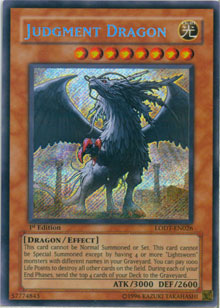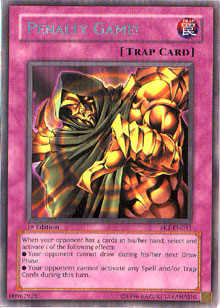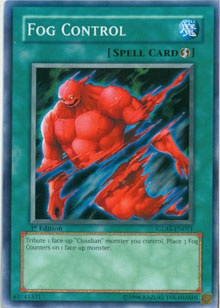 Hello judges! It’s been a very long time, but I’m back to devote a column to the hardworking volunteers. In the past, I’ve covered subjects important to judges in different stages of development — sometimes the articles were geared toward beginning judges, while others focused on topics for experienced judges. During my year and a half in the Organized Play department at Upper Deck, I realized there were a lot of judges in areas without strong level 3 or 2 judges to provide mentorship — so for the next while, I’d like to use this column to help out judges who haven’t had access to a lot of expertise and guidance. They’re overdue for their share of support, so let’s see what we can do to help out.
Hello judges! It’s been a very long time, but I’m back to devote a column to the hardworking volunteers. In the past, I’ve covered subjects important to judges in different stages of development — sometimes the articles were geared toward beginning judges, while others focused on topics for experienced judges. During my year and a half in the Organized Play department at Upper Deck, I realized there were a lot of judges in areas without strong level 3 or 2 judges to provide mentorship — so for the next while, I’d like to use this column to help out judges who haven’t had access to a lot of expertise and guidance. They’re overdue for their share of support, so let’s see what we can do to help out.
We’re going to start things off with a companion piece to this week’s Solid Ground column, and discuss disqualifications and suspensions. There are several articles I could write on these topics, but today I’m just going to outline basic information about these penalties, and explain what is expected of you as a judge. This will better prepare you in the event you take part in a disqualification, and help you educate your players so they can also understand the process.
Now then, first of all — you should know the definitions of these two terms. Players will often use them interchangeably, and you should be alert to this. Make certain everyone at your events understands the difference by providing a clear explanation of each when needed. The following is the same information given in Solid Ground.
Disqualification:
A penalty given out for serious infractions at an event. The player is no longer enrolled in the tournament, and he or she is usually removed from the premises. Depending on the infraction, the player may or may not receive prizes. This penalty can only be handed out by the head judge of the tournament.
Warnings, game losses, and match losses are not disqualifications. A player may continue to play after receiving any of these penalties. If a player opts to drop after receiving a game loss, it is not a disqualification.
Judges should not permit players to avoid a disqualification by dropping from the event if they think they’ll get disqualified. When a player commits an infraction that merits a disqualification, they should be disqualified. Even though dropping seems like it will accomplish the same goal — removing the player from the event — the player needs to receive the appropriate penalty, so his or her case can be reviewed by Upper Deck. Allowing a player who ought to be disqualified to avoid getting a penalty by dropping from the tournament thwarts the purpose of penalty guidelines.
Read over what the Penalty Guidelines has to say on the subject of Disqualifications:
P-8 Disqualification
The Disqualification penalty is a forced removal of a player from the tournament. This penalty has two degrees of severity: with or without prize. In the event of a Disqualification with prize penalty, the player may still be eligible for tournament prizes after the event is over. In the event of a Disqualification without prize penalty, the player forfeits all prizes, with the prize structure shifting down as though the player did not exist in the standings. Only the official head judge may issue the Disqualification penalty, and as part of issuing such a penalty, he or she is required to collect statements from all parties involved, including him- or herself, on the infraction that caused the Disqualification penalty. A disqualification for accumulation of repeat infractions is always with prize.
 P-9 Disqualification Reporting
P-9 Disqualification Reporting
As part of submitting his or her statement, the head judge must include his or her name and UDE number, the event name, the event date, the event sanctioning number, the name of the player receiving the penalty, and that player’s UDE number. The head judge should also include all relevant details surrounding the penalty, including decklists, player background information, and details of all communication with players, spectators, and judges involved. This correspondence may either be emailed to judge@upperdeck.com with the subject line "Disqualification Report for Tournament Commissioner," or mailed to the following address:
Upper Deck Entertainment
Attn: Tournament Commissioner
5909 Sea Otter Place
Carlsbad, CA 92010
Suspension:
Reports are filed for every disqualification — these include statements from the disqualified player, the Tournament Organizer, the Head Judge, and anyone else involved — witnesses, opponents, other judges, etc. These reports are reviewed by the Penalty Committee at Upper Deck. Based on the information in the reports, the committee decides if further action should be taken. A disqualified player may then receive a suspension — a set period of time during which he or she cannot participate in or attend Upper Deck sanctioned events. The length of the suspension depends upon the infraction, and the conduct of the player involved. Players are then considered "suspended," not "banned."
Suspensions are given after the disqualification, never at the tournament: only after review by the Penalty Committee. A player cannot be suspended at a tournament. A player cannot be suspended by a head judge. Also, not every player who gets disqualified will also be suspended. It is a case-by-case process.
In case you're unfamiliar with what the Tournament Policy has to say on the subject of suspension, here's an excerpt:
11. Conduct Unbecoming
Players or spectators violating responsibilities outlined above or committing tournament infractions that result in a disqualification penalty (see Appendix P for more information) may be found by Upper Deck’s Penalty Committee as having conducted themselves in a manner unbecoming of a representative of Upper Deck’s games. Such players may be suspended from all Upper Deck’s tournaments at the discretion of the Penalty Committee. General suspension times and frequent infractions resulting in suspensions are listed below. Upper Deck’s Penalty Committee may adjust individual suspension times based on factors including, but not limited to: players’ willingness to cooperate with the investigation and previous player history. Upper Deck’s Penalty Committee may also determine that the player’s actions do not fall into any of the categories listed below, and in such cases it will determine the most appropriate suspension length based on the severity of the infraction.
Conduct Unbecoming – 1 year
Unsporting Conduct: Cheating
Unsporting Conduct: Severe
Failure to Obey Tournament Official’s Instructions
Obstruction of Investigation
Playing under a Fraudulent Name or UDE Number
Presence at Tournament Venue While Suspended
Tournament Fraud
Conduct Unbecoming: Major – 3 years
Theft
Harassment
Violent Behavior
Vandalism
Severe Tournament Fraud
Conduct Unbecoming: Severe – 5 years or more
Assault
Severe Violent Behavior
Please make sure you always use the correct term, whether you are speaking to a player or another judge — never refer to a disqualification as a suspension or a ban.
As a judge, you also need to familiarize yourself with the penalty guidelines, so you know which infractions may result in a disqualification. (Learning to identify different kinds of infractions is a subject worthy of dedicated discussion, so look for a series of articles in the future addressing this topic. We won’t go into depth here.) Basically, intentional infractions that are classified as severe unsporting conduct, including cheating, theft, and bribery can all rate a disqualification. All judges should make a habit of reading and re reading the Upper Deck tournament policies for all games that you judge, along with the penalty guidelines. All of these files (and more) are kept in the "Files" section of the Upper Deck forums. Here is a handy link – check it out, download the files, and read them over when you’ve finished the article!
You will find the policy and penalty documents in the "Policy Documents" folder. Even if you are not acting as the head judge at events in your area, you should still know how to recognize a situation that may result in a disqualification, and build your confidence in your knowledge of the penalty guidelines. All judges, at any stage of their training and development, need to know the tournament policies and be able to enforce them appropriately.
If you are involved in a disqualification, strive to be professional. If you are acting as a head judge, you may need to disqualify a player. If you are a floor judge, you may need to fill out a statement for a disqualification. You may be on staff at an event where a player gets disqualified, and find players and spectators asking you for information about what happened. Keep these points in mind whenever you are involved in a disqualification, and you’ll know how to respond.

1) Speak with civility and authority, and retain control of the situation.
2) Record all relevant information carefully and specifically.
If you are called upon to fill out a statement, be thorough. Use a piece of scrap paper and organize your thoughts before writing out your statement, because your statement is a valuable part of the report that will be sent in to Upper Deck. Keep your language clear and detailed, and make your handwriting as legible as possible. Avoid using pronouns, which can be confusing to the reader, and refer to the persons involved by name or a consistent definition ("the player", "the opponent", etc.) Include your full name, UDE number, and an email or phone number so the Penalty Committee can contact you if necessary.
3) Don’t get pulled into discussions about the disqualification.
At the event, players or spectators will probably ask you what happened, or have specific questions about the disqualification. Details about the penalty should be kept between the judges and players involved, along with the Tournament Organizer or an on site Upper Deck representative. You can always refer persistent information seekers to the head judge or the tournament organizer.
Be careful what you say after the fact, online or off. Players will often comment on disqualifications in tournament reports, and the accounts are usually one-sided. People who weren’t there or weren’t involved might make comments or assumptions that further distort what happened. Don’t let other posters goad you into commenting on a case — whether you know anything or not, you should not get involved beyond "As a judge, I can’t comment on ongoing investigations." This is difficult when a player or players are bashing on you or a fellow judge. Let the head judge or your tournament organizer know, if you feel it is necessary, but avoid the temptation to get pulled in. Even posting something as simple and straightforward as, "You don’t know all the facts, and you’re drawing conclusions based on a one-sided account," can get you tangled up in an online fight. Use discretion.
This is a light overview of the topic, but rest assured I hope to go into more detail in future articles — every judge should know the best way to fill out a report, conduct or participate in an investigation, and handle the aftermath. In the meantime, you’ve got a good basic understanding of disqualifications and suspensions, and I’ve got an assignment for you. I want every judge to pass this information along to his or her players — you can summarize, or you can actually refer them to these articles. The more effort you put into educating the players in your area, the better off everyone will be. After all, you’ll have learned the information so you can pass it along, so you’ll be better informed. Your players will gain an increased understanding of what is expected of them, and they will make more informed decisions, making the events easier to judge. Win win win all around!
If you haven’t read the Solid Ground article covering this same topic, please go ahead and look it over. You’ll get a bit more information on the subject, and be better prepared to discuss it with your players. Let’s all do our part to demystify these topics, and work toward a well informed judging community and player base.